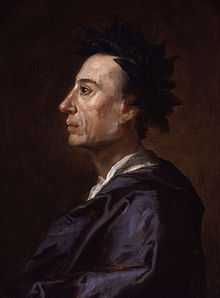Eloisa to Abelard

Published in 1717, Eloisa to Abelard is a poem by Alexander Pope (1688–1744). It is an Ovidian heroic epistle inspired by the 12th-century story of Héloïse d'Argenteuil's illicit love for, and secret marriage to, her teacher Peter Abelard, perhaps the most popular teacher and philosopher in Paris, and the brutal vengeance that her family exacts when they castrate him, even though the lovers had married.
After the assault, and even though they have a child, Abelard enters a monastery and bids Héloïse to do the same. She is tortured by the separation and by her unwilling vow of silence, which she takes with her eyes fixed upon Abélard rather than upon the cross (line 116).
Years later, Abelard completes Historia Calamitatum (History of My Misfortunes), which is a letter of consolation to a friend, and when it falls into her hands, her passion for him is reawakened. Héloïse and Abelard exchange four letters. In an effort to make sense of their personal tragedy, they explore the nature of human and divine love. However, their incompatible male and female perspectives make painful the dialogue for both.[1]
In Pope's poem, Eloisa feels anguish over her powerful feelings (especially in her dreams) for Abélard. She feels further anguish over the realization that Abelard, now a eunuch (which is a mercy that has freed him from the "contagion of carnal impurity"[2]), cannot return her feelings even if he wants to. And so she begs, not for forgiveness, but for forgetfulness.
- No, fly me, fly me, far as pole from pole;
- Rise Alps between us! and whole oceans roll!
- Ah, come not, write not, think not once of me,
- Nor share one pang of all I felt for thee.[3]
In popular culture

Lines 207–210 were spoken in the movie Eternal Sunshine of the Spotless Mind, which borrowed line 209 as its title:
- How happy is the blameless vestal's lot!
- The world forgetting, by the world forgot.
- Eternal sunshine of the spotless mind!
- Each pray'r accepted, and each wish resign'd ...[3]
In short, she is happy only because she has prayed for and received the gift of forgetting everything she's been concerned about. There is an old adage that ignorance is bliss, and such is the case for this woman.
Mary Svevo (Kirsten Dunst), the character who recites these lines, initially claims that it is a quote from "Pope Alexander", before being corrected. Elements of the poem can be seen in the dynamic between Svevo and her employer, Howard Mierzwak (Tom Wilkinson).
An excerpt of a puppet show entitled "Eloisa and Abelard", which depicts the two lovers, is performed by the character Craig Schwartz in the movie Being John Malkovich. Both this film and Eternal Sunshine of the Spotless Mind were written by Charlie Kaufman.
The line "The world forgetting, by the world forgot" is used in the song "Has Anybody Seen Our Ship?" by Noël Coward in his play Red Peppers. The line is also quoted in the short story "Poison" by Katherine Mansfield.
The poem is referenced in the novel Sharpe's Enemy by Bernard Cornwell, where Mme. Dubreton surreptitiously provides the clue to Major Richard Sharpe the she is "withering in my bloom, lost in (a convent's) solitary gloom". This betrays the location of her detention as the "Convent" in the captured village of Adrados, and allows the successful rescue led by Sharpe and Captain William Frederickson between Christmas Eve and the 27th of December, 1812.
Lauren Groff's short story "L. DeBard and Aliette" is based on Eloisa to Abelard. The story was featured in the 2007 edition of The Best American Short Stories.
See also
Notes
- ↑ The Letters of Peter Abelard and Heloise, Augusta State University.
- ↑ The Letters of Peter Abelard and Heloise, Letter 4, Augusta State University.
- ↑ 3.0 3.1 Alexander Pope's "Eloisa to Abelard"
Further reading
| Wikisource has original text related to this article: |
| Wikiquote has quotations related to: Eloisa to Abelard |
- Literary Encyclopedia essay
- "Castrating the Nun in Pope’s Eloisa to Abelard ” (pdf) by Michelle L. Brown, James Madison University
- Discussion of Heloise's Letters to Abelard, Fordham University
- The Poetical Works of Alexander Pope, Volume 1, Gutenberg Project
- Eloisa and the Scene of Writing in Pope’s Eloisa to Abelard, Vitalpoetics Vol. 1: 65-80.
| |||||||||||||||||||||||||||||
